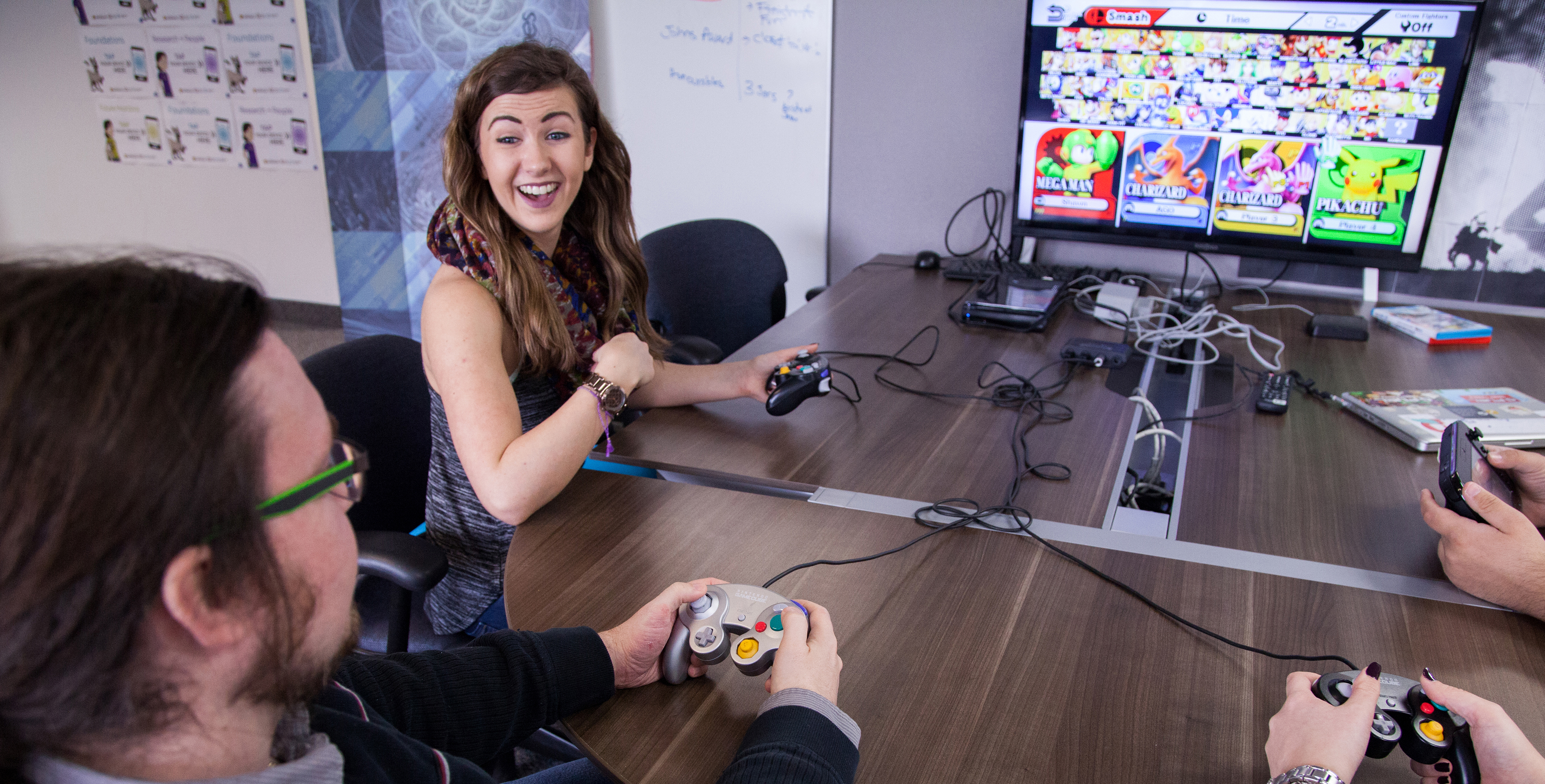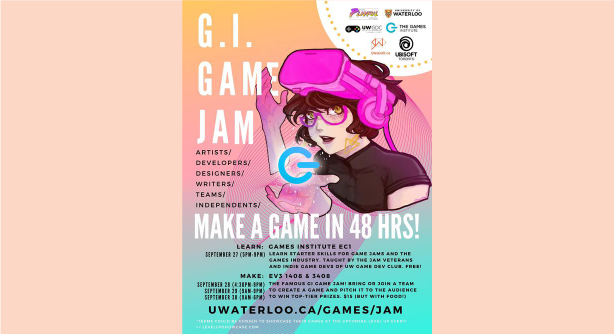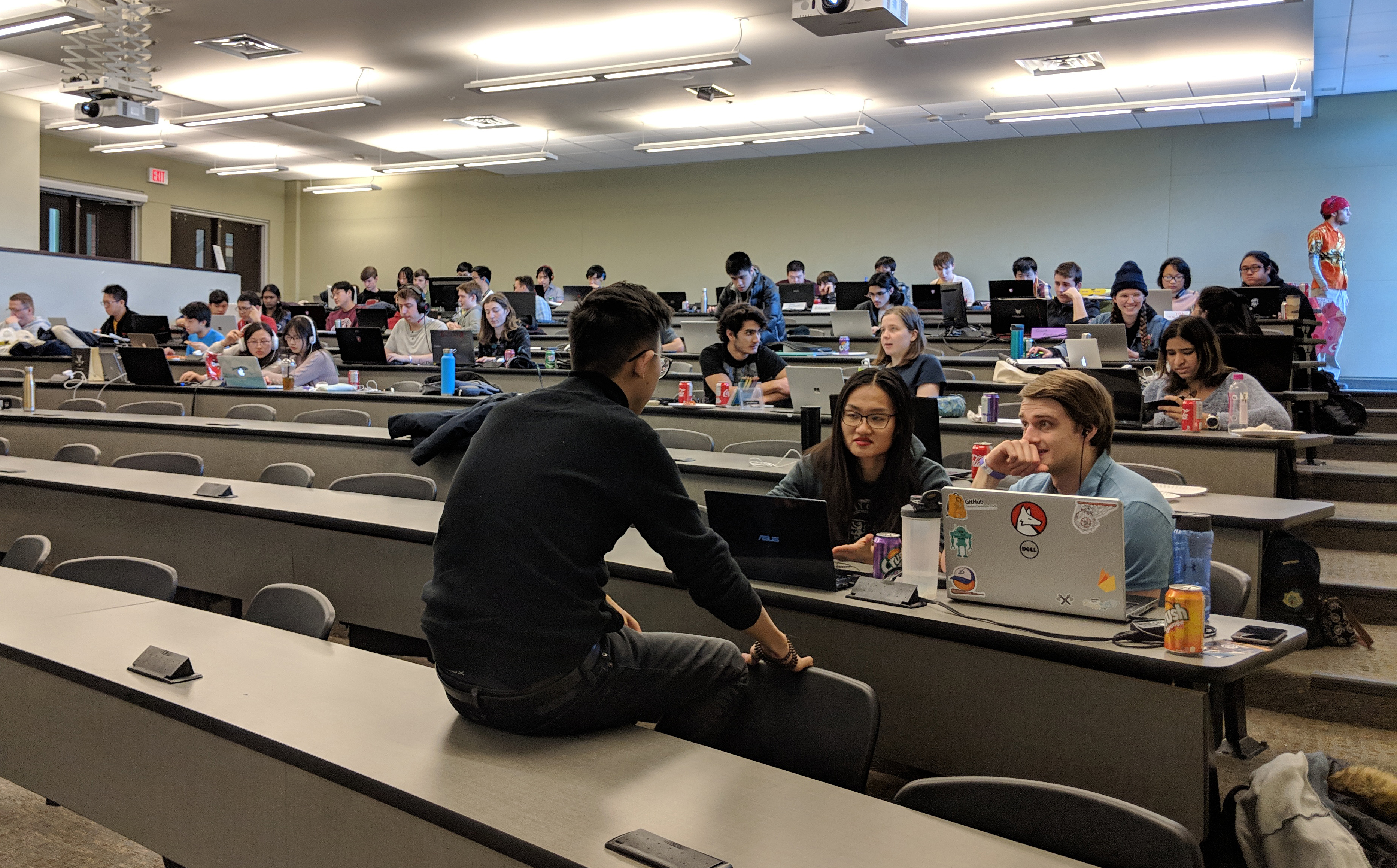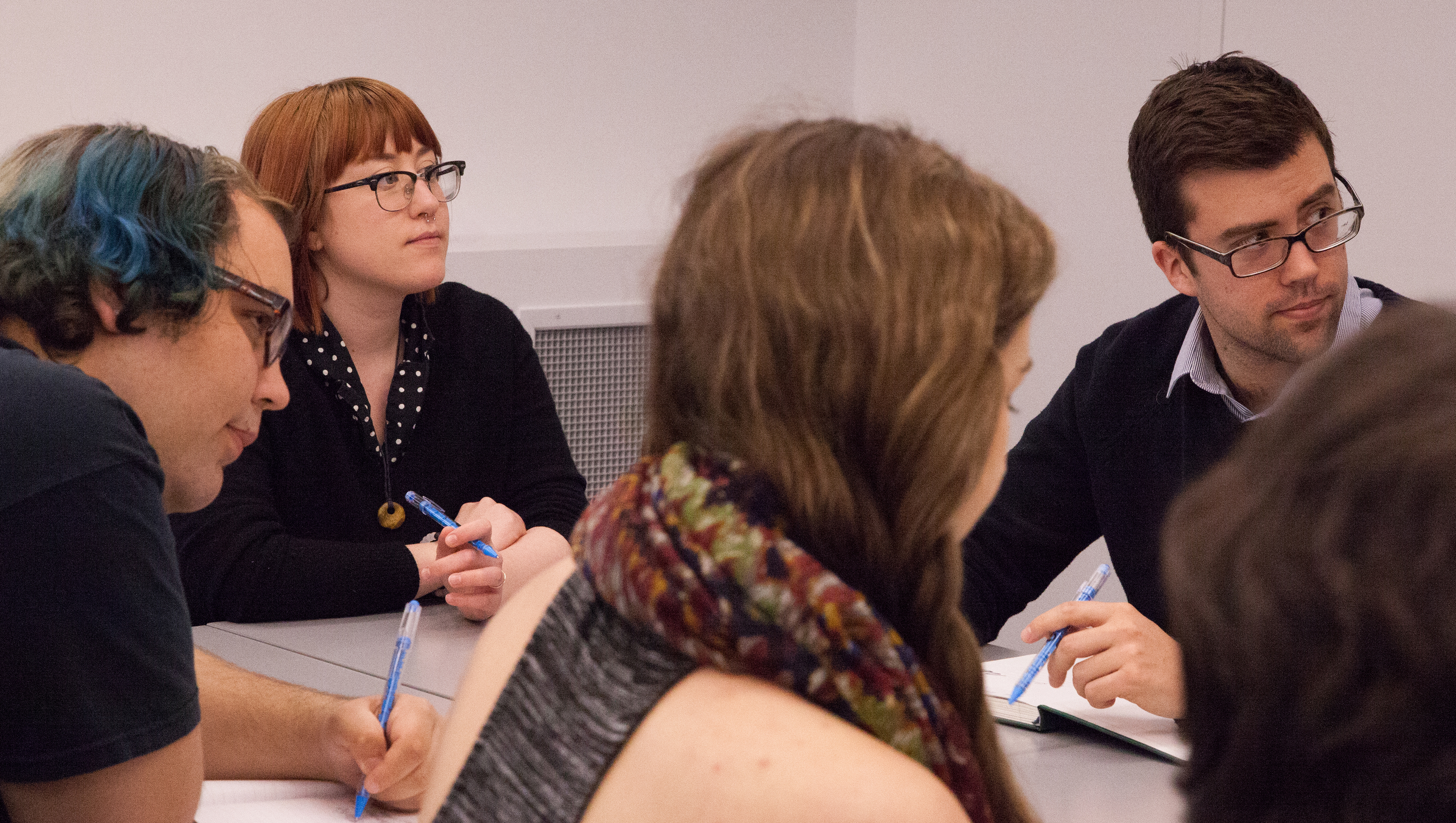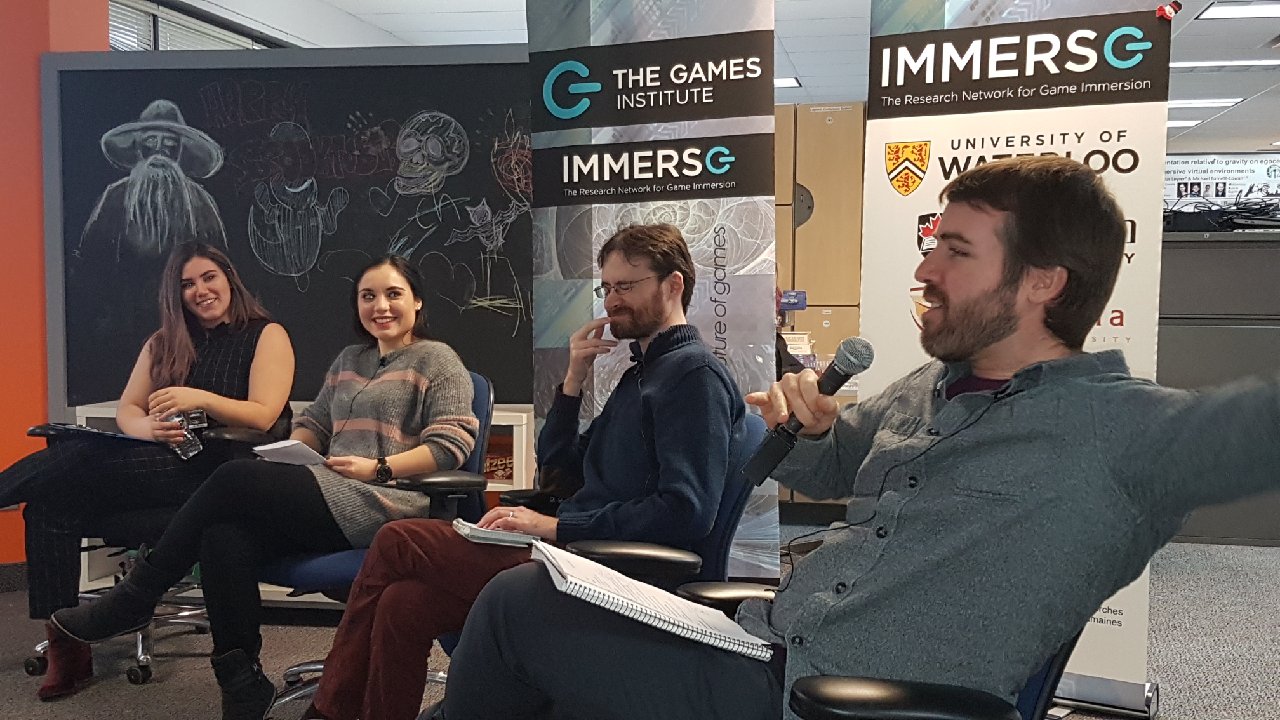University of Waterloo
Games Institute
Click to jump to its affiliated labs and First Person Scholar.
L The Games Institute (GI) at the University of Waterloo was formed in June 2011, when the need for a formal research centre was deemed necessary to push the study of games to the forefront, and ensure that researchers from all departments and faculties at the university could be involved. In the Fall of 2010, UWaterloo Professors Karen Collins, Neil Randall, Chrysanne Di Marco, and Stacey Scott met to discuss how to establish a central organization for games research at the University. They saw that there was a cross-faculty interest for the study of games but no formal games research organization or network yet available. They decided to create a centre and they left their meeting that day with an idea for the Games Institute scrawled out onto a napkin.
The official founders of The Games Institute were Dr. Karen Collins from Drama & Speech Communications, Dr. Neil Randall from English, and Dr. Stacey Scott from Systems Design Engineering. They collaborated to produce an environment where research and creativity from all disciplines could come together to show how games guide us, change us, and help us advance a wide range of fields. From its inception, The Games Institute was designed to be a fully interdisciplinary ecosystem. The existence of this unique research space was a key component for the foundation of the IMMERSe grant.
During early conversations for the formation of the GI, the concept of IMMERSe also came to life. The Social Sciences and Humanities Research Council of Canada (SSHRC) released a call for a new Partnership grant which would go towards the support of a long-term, formal partnership to advance research and knowledge mobilization in the social sciences and humanities ("Partnerships"). Drs. Collins, Randall, and Scott knew that a formal partnership would provide the funding for pioneering research to take place and it would serve as an avenue for studies between the humanities, social sciences, and tech related industries.
The award of the IMMERSe grant was a turning point for the study of games. The funding allowed for the creation of new research directions and synergies between universities. For UWaterloo, the award of the IMMERSe Network meant the formal, sustained establishment of the GI.
The IMMERSe grant has been the focal point of $50,000 in funding from UW’s Dean of Arts to outfit the space to create a thoroughly functional interdisciplinary collaborative environment for students, postdocs, and faculty. In addition, the GI received a CFI grant that was awarded in conjunction with the SSHRC PG. The CFI grant gave funding to a cluster of labs called WatGAME (The Waterloo Game Analysis and Monitoring Environment). Specifically designed with IMMERSe research projects in mind, the WatGAME labs are equipped to simulate real-world spaces such as a living room, entertainment rooms, and social spaces where gameplay may occur. IMMERSe activities were later leveraged to include a CFI funded WatVRStory (Waterloo Virtual Reality Storytelling) lab co-located at The Games Institute and the Engage Lab at the University of Waterloo’s Stratford campus.
As of 2019, The Games Institute has nearly 200 members, 50 of which have office space in the institute including IMMERSe’s Principal Investigator. Student and faculty members from the humanities, computer science, engineering, and the social sciences collaborate, physically and virtually, in the space and leverage the GI’s infrastructure to pursue the advancement of research and knowledge in games-related interactions and technologies driven by the six themes of IMMERSe.
Affiliated Labs
Since its formation in 2011, many focused research groups have thrived at the GI, largely due to the support of IMMERSe partnerships.
The Engage Lab is affiliated with The Games Institute and located at the University of Waterloo Stratford campus. The focal point of this lab is gamification, most readily defined as the application of game structures, mechanics, and reward systems to traditionally non-game settings. Multi-institution conferences have been held at both the GI as well as the Engage Lab to bring together researchers in the name of games and immersion research.
The Multisensory Brain and Cognition (MBC) Lab, directed by Dr. Michael Barnett-Cowan at the University of Waterloo, is also affiliated with the GI. Their research projects focus on improving human health and well-being using games technology. Specifically, the MBC Lab investigates how the brain integrates multisensory information to impact the design of more immersive and engaging experiences in games for recreational and rehabilitative purposes.
Waterloo HCI is a consortium of faculty and students at the University of Waterloo who carry out research in Human-Computer Interaction (HCI), with natural connections to game systems. The affiliated TouchLab directed by Dr. Mark Hancock, Associate Director of The Games Institute, is a research group dedicated to the study of human-computer interaction and information visualization. Several games have been developed as a partnership between the TouchLab and the GI, which would not have been possible without support from the IMMERSe network.
Based at the GI, IMMERSe collaborator Dr. Lennart Nacke directs the HCI Games Group to conduct research in information and communication technologies, design, psychology, and human-computer interaction with games. Their projects span a wide range of the IMMERSe themes by targeting areas such as games user research, health and fitness gaming, as well as gamification of social recruitment applications.
The Interaction Data Exploration and Analysis (IDEA) Lab conducts studies into how to better interact with and interpret data. Their research bridges the disciplines of Health Informatics, Computer Science, Psychology, and Human Factors Engineering ("Interactive Data Exploration and Analysis Lab").
qCollaborative (qlab) is a collaborative group of researchers from the Department of Communication Arts at the University of Waterloo, the School of Communication Studies at Mount Royal University, and the College of Fine & Applied Arts at the University of Illinois at Urbana-Champaign. The qCollaborative undertakes design research projects related to social justice, remediating experience, materializing the digital, and feminist placemaking ("About qLab").
The Games Institute operates an internationally referenced online games studies periodical, First Person Scholar (FPS). This middle-state publication aims to occupy the niche between academic blogs and journals in establishing an informed, sustained conversation about games. Maintained by graduate student members of The Games Institute, FPS publishes essays, commentaries, podcasts, and book reviews from both University of Waterloo writers as well as contributors from across the globe.
FPS has contributed to the knowledge translation and dissemination goals of the IMMERSe network, reaching a broad audience upwards of 2,800 people by Facebook alone. Articles from FPS have also appeared on Syllabi in China. You can see more information on FPS under the Projects section of the website.
Although IMMERSe provided the funding to make the research happen it was the researchers that truly carried the passion of IMMERSe forward. By examining the research coming out of the institutions we can begin to learn more about the network and the research visions that guided it. To learn more about IMMERSe research through the GI, click the link below.
Social Sciences and Humanities Research Council. Funding, 2017, .sshrc-crsh.gc.ca/funding-financement/programs-programmes/partnership_grants_stage1-subventions_partenariat_etape1-eng.aspx. Accessed 1 May. 2019.
"Interactive Data Exploration and Analysis Lab.” University of Waterloo, https://uwaterloo.ca/interactive-data-exploration-and-analysis-lab/. Accessed 1 May, 2019.
“About qlab” qcollaborative, http://www.qcollaborative.com/ Accessed 1 May, 2019.

